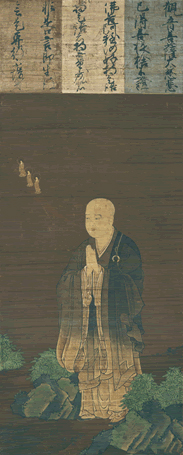Shandao, da shi, 613-681
Enlarge text Shrink textShandao (simplified Chinese: 善导大师; traditional Chinese: 善導大師; pinyin: shàndǎo dàshī; Japanese: Zendō Daishi; 613–681) was a Chinese Buddhist scholar monk and an influential figure of East Asian Pure Land Buddhism. Shandao was one of the first Pure Land authors to argue that all ordinary people, and even the most evil person, can be reborn in the Pure Land by relying on the karmic power of Amitābha Buddha's past vows. Shandao was also one of the earliest Pure Land authors to teach the primacy of faithfully reciting Amitābha's name (Ch: nianfo). Shandao saw this practice as sufficient for birth in the Pure Land, and as the supreme practice (even more important than meditation). This, along with Shandao's efforts to teach common laypeople in various ways, like disseminating paintings of the Pure Land, made Pure Land Buddhism much more accessible and popular among the common people. Several modern scholars consider Shandao to be the central figure of the Chinese Pure Land tradition. According to Alfred Bloom, Shandao "systematized Pure Land thought and brought it to its highest peak of development in China." Shandao's writings had a strong influence on later Pure Land masters, especially his teachings on recitation of the Buddha's name and on faith. He is also very important for Japanese pure land founders Hōnen and Shinran. In Jōdo Shinshū, he is considered the Fifth Patriarch, while in Chinese Pure Land Buddhism, he is considered the second patriarch after Lushan Huiyuan. Shandao was so influential to the Pure Land tradition that he eventually came to be seen as a manifestation of the Buddha himself (a Nirmāṇakāya).
Read more on Wikipedia >
 Personality
Personality


.jpg)





